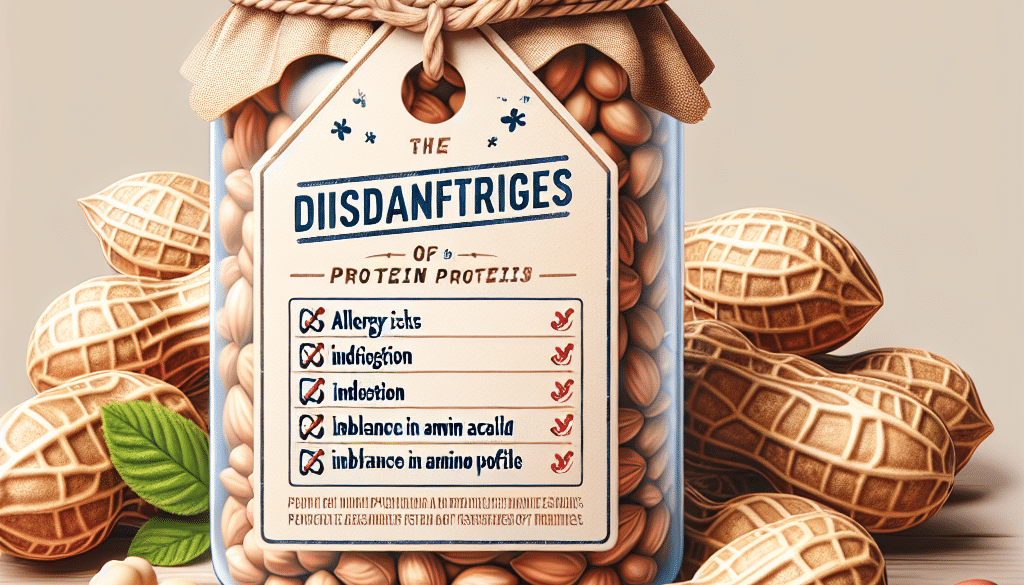What Are The Disadvantages Of Peanuts Protein?
-
Table of Contents
Peanuts Protein: Understanding the Disadvantages

Peanuts are a popular snack and a rich source of protein, especially for those following a plant-based diet. However, despite their nutritional benefits, peanut protein can have several disadvantages that may affect certain individuals. This article explores the potential drawbacks of peanut protein, providing insights into why it may not be the ideal protein source for everyone.
Allergenic Potential of Peanuts
One of the most significant disadvantages of peanut protein is its potential to cause allergic reactions. Peanuts are one of the most common food allergens, and the reactions can range from mild to life-threatening anaphylaxis. According to the American College of Allergy, Asthma, and Immunology, peanut allergies affect approximately 2.5% of American children and can persist into adulthood.
- Severity of Reactions: Even trace amounts of peanuts can trigger severe reactions in sensitive individuals.
- Impact on Quality of Life: The fear of accidental exposure can lead to anxiety and a reduced quality of life for those with peanut allergies and their families.
- Need for Vigilance: Individuals with peanut allergies must constantly read labels and be cautious about cross-contamination in food preparation areas.
Limited Amino Acid Profile
While peanuts contain a significant amount of protein, they do not provide a complete amino acid profile. Peanuts are low in the essential amino acid methionine, which is vital for various bodily functions, including metabolism and detoxification.
- Importance of Methionine: As an essential amino acid, methionine must be obtained through diet, and its deficiency can lead to health issues.
- Combining Protein Sources: To obtain a complete amino acid profile, individuals relying on peanut protein may need to combine it with other protein sources, such as rice or soy.
High Caloric Density
Peanuts are energy-dense, with a high fat content that contributes to their caloric value. While the fats in peanuts are predominantly healthy unsaturated fats, excessive consumption can lead to weight gain.
- Weight Management: Individuals watching their calorie intake may need to limit their consumption of peanuts to avoid excess calories.
- Portion Control: It can be challenging to practice portion control with peanuts due to their addictive taste and small size.
Presence of Aflatoxins
Peanuts are susceptible to contamination by a mold called Aspergillus flavus, which produces aflatoxins. These toxins are known to be carcinogenic and can pose a health risk if consumed in large quantities over time.
- Health Risks: Long-term exposure to aflatoxins has been linked to an increased risk of liver cancer.
- Regulatory Limits: Many countries have established limits for aflatoxin levels in food, but not all peanut products may be adequately monitored.
Environmental Concerns
The cultivation of peanuts can have environmental impacts that are worth considering. Peanuts require specific growing conditions and can contribute to soil depletion if not managed sustainably.
- Water Usage: Peanut farming can be water-intensive, which is a concern in areas facing water scarcity.
- Soil Health: Without proper crop rotation, peanut cultivation can lead to soil nutrient depletion and increased vulnerability to erosion.
Conclusion: Weighing the Pros and Cons
While peanuts are a nutritious source of plant-based protein, they come with several disadvantages that may outweigh their benefits for some individuals. The risk of allergic reactions, incomplete amino acid profile, high caloric density, potential aflatoxin contamination, and environmental concerns are all factors to consider when incorporating peanut protein into your diet. It is essential to evaluate these drawbacks in the context of your dietary needs, health goals, and environmental values.
Discover ETprotein’s Alternative Protein Products
If you’re looking for alternative protein sources that may mitigate some of the disadvantages associated with peanut protein, ETprotein offers a range of high-quality, organic plant-based proteins. Their products, including rice protein, pea protein, and various seed proteins, provide diverse options for those seeking allergen-free, non-GMO, and environmentally friendly protein solutions.
ETprotein’s commitment to quality and sustainability makes them a reliable choice for consumers and manufacturers alike. Whether you’re formulating new health and wellness products or simply looking to diversify your protein intake, ETprotein has the expertise and product range to meet your needs.
About ETprotein:
ETprotein, a reputable protein and L-(+)-Ergothioneine (EGT) Chinese factory manufacturer and supplier, is renowned for producing, stocking, exporting, and delivering the highest quality organic bulk vegan proteins and L-(+)-Ergothioneine. They include Organic rice protein, clear rice protein, pea protein, clear pea protein, watermelon seed protein, pumpkin seed protein, sunflower seed protein, mung bean protein, peanut protein, and L-(+)-Ergothioneine EGT Pharmaceutical grade, L-(+)-Ergothioneine EGT food grade, L-(+)-Ergothioneine EGT cosmetic grade, L-(+)-Ergothioneine EGT reference grade and L-(+)-Ergothioneine EGT standard. Their offerings, characterized by a neutral taste, non-GMO, allergen-free attributes, with L-(+)-Ergothioneine purity over 98%, 99%, cater to a diverse range of industries. They serve nutraceutical, pharmaceutical, cosmeceutical, veterinary, as well as food and beverage finished product distributors, traders, and manufacturers across Europe, USA, Canada, Australia, Thailand, Japan, Korea, Brazil, and Chile, among others.
ETprotein specialization includes exporting and delivering tailor-made protein powder and finished nutritional supplements. Their extensive product range covers sectors like Food and Beverage, Sports Nutrition, Weight Management, Dietary Supplements, Health and Wellness Products, and Infant Formula, ensuring comprehensive solutions to meet all your protein needs.
As a trusted company by leading global food and beverage brands and Fortune 500 companies, ETprotein reinforces China’s reputation in the global arena. For more information or to sample their products, please contact them and email sales(at)ETprotein.com today.














